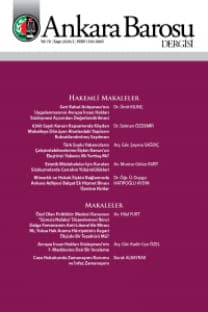KKTC Hukuku’nda İdarenin Haksız Fiil Sorumluluğu
İdarenin sorumluluğu hizmet kusuru, temelde bir kamu hukuku problemi
olmasına rağmen KKTC’de, İngiliz Hukuku’nun da etkisiyle, konu haksız fiil
sorumluluğu çerçevesinde değerlendirilmektedir. Bu nedenle, idareye karşı
açılan bu tür davalar adli dava niteliğinde olup Kaza Hukuk Mahkemelerinde
görülmektedir. Nitekim, KKTC Anayasası da Yüksek İdare Mahkemesi’nin
yetki alanına giren davalar arasında hizmet kusuru nedeniyle açılan davalara
yer vermemiştir.
İdarenin hizmet kusuru nedeniyle açılan davalar, zararın meydana geldiği
kamu kurum veya kuruluşunun bağlı olduğu Bakanlığa karşı, Haksız Filler
Yasası m.13/1’de yer alan “işverenin müstahdemin fiilerinden sorumluluğu”
çerçevesinde açılmaktadır. Söz konusu hüküm, “bir işveren, müstahdeminin
herhangi bir fiilinden, bu fiil yapılmasına yetki vermiş olacağı veya yapılmasını
onaylayacağı bir fiil ise veya bu fiil müstahdemin istihdam edilmekte olduğu
sırada yapılmışsa sorumlu olur” şeklinde düzenlenmiştir.
Çalışmanın amacı, KKTC Hukuku’nda farklı bir şekilde düzenlenmiş olan
konunun, tüm özellikleriyle anlatılması ve benzer uygulamaların yapıldığı
İngiliz Hukuku ile Kıbrıs Rum Kesimindeki yasal düzenlemeler ve mahkeme
kararlarıyla karşılaştırılmasıdır.
Anahtar Kelimeler:
İstihdam eden, müstahdem, KKTC, haksız fiil, tazminat
In spite of the way that the administration defect is for the most part an open
law issue, it is surveyed in the TRNC, affected by British law, subject to the
tort risk issue.For this reason, such cases against the administration are in the
nature of judicial proceedings and appear in the Civil Court of Accidents. As
a matter of fact, the Constitution of the TRNC also did not include a lawsuit
filed due to a service fault among the cases that fall within the jurisdiction of
the Supreme Administrative Court.
The lawsuits filed due to service malpractice are opened against the Ministry,
where the public institution or organization to which the damage is caused
depends, under the “Responsibility of the employer for the damages of the
employees” in Article 13/1 of the Unfair Labor Law. The said provision is that
“an employer is responsible for any act of the employee, if it is an act which
will authorize the execution of this act or to approve the act, or if the act is
made while the employee is employed”.
The aim of the study is to compare the different aspects of the TRNC law with
those of the British law and the legal regulations and court decisions in Cyprus
Keywords:
Employer, compensation, TRNC, tort,
___
- Dichter, Mark / Turnbull, Kenneth / Howse, Matthew / Zelek, Mark, Labour & Employment, UK, 2011. Elliott, Catherine / Quinn, Frances, Tort Law, UK, 2007, s. 361-362. Gürler, Emir Ali, KKTC Hukuku’nda Tıbbi Müdahalenin Hukuka Uygunluğu, İstanbul, 2017. Horsey, Kirsty/Rackley, Erika, Tort Law, UK, 2009, s. 325. Külahçı, Şölen, KKTC Sağlık Hukuku, İstanbul, 2016. Leyland, Peter / Anthony, Gordon, Administrative Law, UK, 2012. Necatigil, Zaim, Kuzey Kıbrıs Türk Cumhuriyeti’nde Anyasa ve Yönetim Hukuku’nun Esasları, Lefkoşa, 2015. Nomer, Haluk, Borçlar Hukuku (Genel Hükümler), İstanbul, 212.Nomer, Haluk, Borçlar Hukuku, İstanbul, 2012. Oğuzman, Kemal / Öz, Turgut, Borçlar Hukuku (Genel Hükümler), İstanbul, 2009 Öz, Turgut, Yeni Borçlar Kanunu’nun Getirdiği Yenilikler,İstanbul, 2012. Reisoğlu, Safa, Borçlar Hukuku (Genel Hükümler), İstanbul, 2011. Stauch, Marc / Wheat, Kay / Tingle, John, Medical, Law, NewYork, 2007. Stauch, Marc / Wheat, Kay, Text, Cases and Materials on Medical Law and Ethics, New York, 2005. Şenocak, Zarife, Borçlunun İfa Yardımcılarından Dolayı Sorumluluğu, Ankara, 1995. Tandoğan, Haluk, Kusura Dayanmayan Sözleşme Dışı Sorumluluk Hukuku, Ankara, 1981. Turhan, Turgut, Tarihsel Bakış Açısıyla Kıbrıs Türk Hukuk Sistemi, AÜHFD, Y. 2008, C. 57, S. 2, s. 253-286.
- ISSN: 1300-9885
- Yayın Aralığı: Yılda 4 Sayı
- Başlangıç: 1942
- Yayıncı: Ankara Barosu Başkanlığı
Sayıdaki Diğer Makaleler
Roma’da Devlete Karşı İşlenen Bazı Suçlar ve Cezaları
KKTC Hukuku’nda İdarenin Haksız Fiil Sorumluluğu
Türk Hukukunda Tahkim Anlaşmasının Geçerliliği
Cenker GÖKER, Yunus Emre YILMAZOĞLU
Bilge ÖZTAN, Hatice Tolunay OZANEMRE YAYLA
Yargı Kararları Işığında Vergi Hukuku’nda Usulsüz Tebliğ ve Sonuçları
